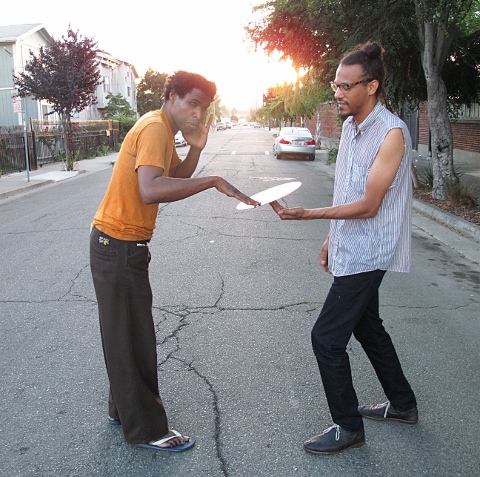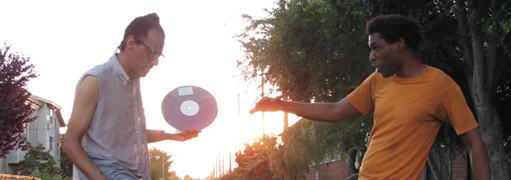Postmodernism can be a big, noisy thing, imbued with the knowledge of diverse human cultures and the aesthetic, political and personal concerns that arise from its multilimbed praxis. In music, it can become a complex discourse touching on intention and audience reaction. The Alibi discussed the nature of this artistic behemoth as manifested by Bay Area musical visionaries Marshall Trammell and Zachary James Watkins. Touring as Black Spirituals for debut Of Deconstruction, they present their interpretation of the avant-garde at Spirit Abuse (1103 Fourth Street NW) on Saturday, Aug. 23, at 9pm. Admission to this all-ages show is $5, and nuevomexicano luminaries Bigawatt and Mesa Ritual open.How did Albuquerque and Spirit Abuse become part of your tour plans?Zachary James Watkins (ZJW): I grew up in Lubbock [Texas]. My parents are both artists. Santa Fe was a place we went to visit galleries. Now I’m on the board of the San Francisco Electronic Music Festival. Just being involved in that scene, I learned about [Spirit Abuse co-founder] Raven Chacon. I was very inspired by his compositions. I suggested we ask him to perform [at the festival]. We’ve been in email contact ever since. We share a record label [SIGE Records] with his project Mesa Ritual. It just seemed to make sense. Plus Spirit Abuse is an infamous venue.How did your collaboration as Black Spirituals come about?Marshall Trammell (MT): We had a mutual friend Randy Sutherland. He was raving about this tall skinny composer. He got us involved with each other. Zac was also in conversation with a guitarist named Morgan Craft. Zac was very proactive and put together a meeting. The result was we went down to Santa Cruz and performed for a workshop of music students. And then we performed at the Emergent Gallery in San Francisco. Morgan went to live in Italy, and we started working together as a duo.What sort of experience informs your work, personally and collaboratively?ZJW: We’re both invested in creativity as a lifestyle. My interest is to not feel boxed in—in how my voice might manifest based on a number of factors including region, being West Coast. What does West Coast music sound like? Also ethnicity: What does black music sound like? The most important thing in my output is that I do what feels right. George Lewis, an African-American composer and pioneer in electronic music and improvisation, is one of my heroes. … Black Spirituals is about diversity in new music communities. Marshall was also thinking about these things. He’s really not just playing music to play. He’s really invested in what else is going on. How is this serving anything? What questions are we really asking? We’re trying to broaden the conversation. Who is this helping? What is it for?MT: After graduate school, I got into social justice work in the Bay Area and played the drums, mostly free jazz. I was working with a group that was going to Chiapas [Mexico]. [We were] analyzing the struggle there and coming back to the United States to talk about how we build a movement here—given the historical situation we’re in. As a musician, I’m very interested in how fellow artists thought about those things and have a language for discussing race and class. We created a vernacular to meet those needs. As a group, Black Spirituals is moving toward creating a bridge between music and social concern.What is your composition process?ZJW: About 10 years ago, I decided I wanted to play live. I’d been studying composition, sitting in front of manuscript paper, writing my ideas out and giving them to musicians. I still love to do that, but I started to recognize the importance of performance, generating material in real time as an improviser. I’ve always been an improviser. I think the Bay Area helped me realize there was a whole world of improvisers. I think about what frequencies I’m interested in exploring; and I get really deep into the idea of tuning, like tuning my guitar to harmonic partials. I learn the things I like about that tuning. I’ve come across some really powerful intervals using this method. That’s how I start.MT: We work on our individual things. We bring it together as a dialogue of sound. We acknowledge each other. The feeling of Zac’s musical decision-making is of such an acute quality that I seek to respond to that—engaging my body, accessing a multi-aesthetic sound that is evolving as we are listening. For me it goes back to early Albert Ayler records. When I first heard that shit, I felt like [those musicians were] all playing in different rooms. It’s like a novel that unfolds and changes inside you. Our dialogues are like that. They’re vernacular as opposed to “What is the style you’re playing?”Is your work deconstructive, and is deconstruction of musical composition important in your work?MT: As a drummer, one of my goals was mapping my drum set. I was inspired by the work of Vijay Iyer. I mapped all the triangles in the set, giving each drum or cymbal a letter or number, a reference point. Then I went about exposing each of the potential configurations. In that multi-aesthetic approach, I can approach or embody different styles of music, different texts, depending on the triangles I use. Each combination works like cultural DNA. This approach enabled me to move away from jazz playing using the drum kit as a filter for different units of cultural DNA, different percussive languages.ZWJ: I’ve always been a composer and songwriter. As I continue to do this work, I ask myself, especially in moments of compositional crisis, “What’s the essence of the idea?” I’m interested in connecting with people, but I want to be free to do what I feel is musically correct. I’ve also become interested in the universal—what is above culture, like the mechanics of the human ear. I’m imagining antiquity, how those early people may have experienced the invention of a new sound. I’m hoping there are things that haven’t been done yet.










